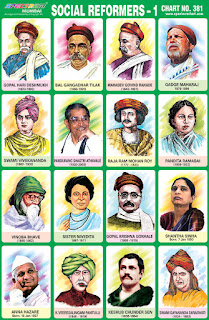 |
| Social Reformers 1 Chart |
Spectrum Chart - 381 : Social Reformers 1
1. Gopal Hari Deshmukh - Gopal Hari
Deshmukh was a social reformer from Maharashtra. He promoted
emancipation (liberation) and education of women, and wrote against
arranged child marriages, dowry system and polygamy, all of which
were prevalent in India in his times. He wrote against the evils of
the caste system which was strongly prevalent in India in his times &
condemned harmful Hindu religious orthodoxy.
2. Bal Gangadhar Tilak - Bal Gangadhar
Tilak was an Indian nationalist, teacher, social reformer, lawyer and
an independence activist. He was the first leader of the Indian
Independence Movement. Tilak was one of the strongest advocates of
"Swaraj" (self-rule).
3. Mahadev Govind Ranade - Mahadev Govind
Ranade was a distinguished Indian scholar, social reformer and
author. He was a founding member of the Indian National Congress &
owned several designations as member of the Bombay legislative
council, member of the finance committee at the centre and the judge
of Bombay High Court.
4. Gadge Maharaj - Gadge Maharaj was a
saintly social reformer, a wandering mendicant who held weekly
festivals with the help of his disciples across Maharashtra. His
reforms and visions for villages in India are still a source of
inspiration for various political parties and non-government
organizations. He conducted his discourses in the form of "Kirtans"
in which he would emphasize values like service to humanity and
compassion. During his Kirtans, he would educate people against blind
faiths and rituals.
5. Swami Vivekanand - Swami Vivekanand was
the chief disciple of the Sri Ramakrishna Paramahansa. At birth, he
was called Narendranath Datta. He was the founder of Ramakrishna
Mission. He introduced Hindu philosophies of Vedanta and Yoga in
Europe and America.
6. Pandurang Shastri Athavale - Pandurang
Shastri Athavale was an Indian philosopher, spiritual leader, social
activist and Hinduism reformist, who founded the Swadhyaya Parivar in
1954. Swadhyaya is a self-study process based on the Bhagavad Gita
which has spread across nearly 100,000 villages in India.
7. Raja Ram Mohan Roy - He was the founder
of the Brahmo Sabha movement in 1828. His efforts to protect Hinduism
and Indian rights by participating in British government earned him
the title "The Father of the Indian Renaissance". He
crusaded against social evils like sati, polygamy and child marriage.
He also demanded property inheritance rights for women.
8. Pandita Ramabai - Pandita Ramabai was
an Indian social reformer, a champion for the emancipation of women
and a pioneer in education. She acquired a reputation as a Sanskrit
scholar. Ramabai was also a poet and scholar. In order to learn more
about the education of women and receive training for her lifelong
battle to help unshackle the women in India, she visited most parts
of India.
9. Vinoba Bhave - He was an Indian
advocate of nonviolence and human rights. Often called Acharya , he
is best known for the Bhoodan Movement. He is considered as a
National Teacher of India and the spiritual successor of Mahatma
Gandhi.
10. Sister Nivedita – Sister Nivedita was
a Scots-Irish social worker, author, teacher and a disciple of Swami
Vivekananda. In November
1898, she opened a girls' school in Bagbazar area of Calcutta. She
wanted to educate those girls who were deprived of even basic
education. During the plague epidemic in Calcutta in 1899 Nivedita
nursed and took care of the poor patients. Nivedita had close
associations with the newly established Ramakrishna Mission.
11. Gopal Krishna Gokhale - Gopal Krishna
Gokhale was one of the social and political leaders during the Indian
Independence Movement against the British Empire in India. He founded
the Servants of India Society. The Society took up the cause of
promoting Indian education in earnest and among its many projects
organised mobile libraries, founded schools and provided night
classes for factory workers.
12. Shantha Sinha - Shantha Sinha is an
anti-child labour activist of international reputation. She headed
the National Commission for Protection of Child Rights (NCPCR) for
two consecutive terms. As a rights activist, her contribution to
reduction in child labour in nearly 500 villages of Ranga Reddy
district in Andhra Pradesh is unparalleled. Recognizing her work, the
Government of India appointed her as the first chairperson of the
newly formed NCPCR. She was awarded the civilian honour of Padma Shri
by the Government of India in 1998.
13. Anna Hazare – Anna Hazare is an
Indian social activist who led movements to promote rural
development, increase government transparency and investigate and
punish corruption in public life. Hazare also contributed to the
development and structuring of Ralegan Siddhi, a village in Parner
taluka of Ahmednagar district, Maharashtra. He was awarded the Padma
Bhushan the third-highest civilian award by the Govt. of India in
1992 for his efforts in establishing this village as a model for
others.
14. K. Veeresalingam Pantulu - Kandukuri
Veeresalingam was a social reformer, writer of Andhra Pradesh. He
encouraged education for women, remarriage of widows which was not
supported by the society during his time. He also started a school in
Dowlaiswaram in 1874. His novel Rajasekhara Charitramu is considered
to be the first novel in Telugu literature.
15. Keshub Chander Sen - Keshab Chandra Sen
was an Indian Bengali Hindu philosopher and social reformer who
attempted to incorporate Christian theology within the framework of
Hindu thought. In 1855 he founded an evening school for the children
of working men.
16. Swami Dayanand Saraswati - Swami
Dayanand Saraswati was a Hindu religious leader who founded the Arya
Samaj, a Hindu reform movement of the Vedic tradition. He was the
first to give the call for Swarajya as "India for Indians"
– in 1876, later taken up by Lokmanya Tilak.

No comments:
Post a Comment